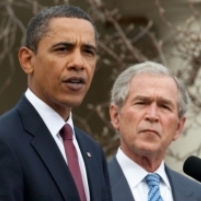George W. Bush Overthrew the Elected Leader of Haiti; Now He’s Expected to Help?
Tuesday, January 19, 2010
 (photo: White House)
(photo: White House)
Critics of American foreign policy towards Haiti have had a hard time swallowing the selection of former President George W. Bush as co-chair of the United States’ relief efforts. They point out that it was during the Bush administration, in February 2004, that Haitian President Jean Bertrand Aristide was forced to leave the country by American soldiers—a claim denied by Bush supporters who insisted Aristide was escorted to Africa for his own safety.
On February 17, 2004, U.S. Secretary of State Colin Powell defended Aristide as the “free and fairly elected President of Haiti,” and added that “we cannot buy into a proposition that says the elected President must be forced out of office by thugs and those who do not respect law and are bringing terrible violence to the Haitian people.” Two days later, he repeated, in an interview with Knight-Ridder, that “President Aristide is the democratically selected President of Haiti, and we are not interested in an outcome that would force him from power.” Yet only ten days after that, U.S. military personnel escorted Aristide to an airplane and out of Haiti, allowing an unelected rebel force to seize power. TransAfrica founder Randall Robinson has characterized the removal of Aristide as an abduction by the U.S., and has written a book on the subject: An Unbroken Agony: Haiti, from Revolution to the Kidnapping of a President
Robinson also has been critical of former President Bill Clinton, the other co-chair of the U.S. relief effort, for supporting economic policies that created sweatshops in Haiti. “Haitians in Haiti today make 38 cents an hour,” Robinson told Democracy Now. “They don’t make a high enough wage to pay for their lunch and transportation to and from work. But this is the kind of economic program that President Clinton has supported.”
Bill Quigley, legal director for the Center for Constitutional Rights and a Haiti human rights advocate, notes that U.S. economic policies forced Haiti, which used to be self-sufficient in rice production, into becoming an importer of rice. A similar transformation happened with its sugar production.
“The U.S. and the U.S.-dominated world financial institutions—the International Monetary Fund and the World Bank—forced Haiti to open its markets to the world,” writes Quigley. “Then the U.S. dumped millions of tons of U.S. subsidized rice and sugar into Haiti—undercutting their farmers and ruining Haitian agriculture. By ruining Haitian agriculture, the U.S. has forced Haiti into becoming the third largest world market for U.S. rice. Good for US farmers, bad for Haiti.”
-David Wallechinsky
What Bush Did to Haiti (by David Swanson, Public Record)
Aristide Haiti Return- Clinton, Bush & Obama of One Mindset (Zen Haitians)
The Long History of Troubled Ties between Haiti and the US (by Vanessa Buschschluter
BBC News)
BBC News)
“Bush was Responsible for Destroying Haitian Democracy”–Randall Robinson on Obama Tapping Bush to Co-Chair US Relief Efforts (Democracy Now)
Why the US Owes Haiti Billions - The Briefest History (by Bill Quigley, Huffington Post)
- Top Stories
- Unusual News
- Where is the Money Going?
- Controversies
- U.S. and the World
- Appointments and Resignations
- Latest News
- Can Biden Murder Trump and Get Away With it?
- Electoral Advice for the Democratic and Republican Parties
- U.S. Ambassador to Greece: Who is George Tsunis?
- Henry Kissinger: A Pre-Obituary
- U.S. Ambassador to Belize: Who is Michelle Kwan?






Comments